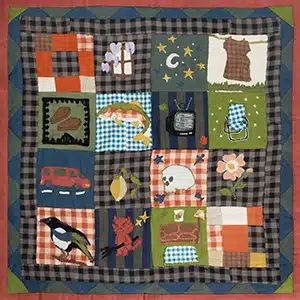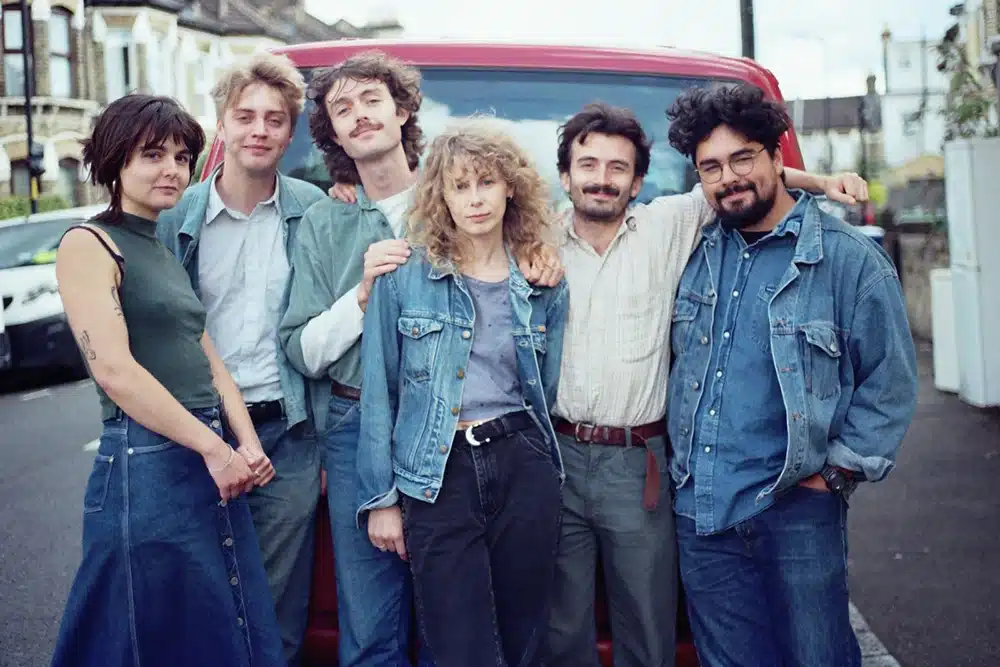
Brown Horse are a fable. Their name evokes Cormac McCarthy, Sam Shepard, the American Frontier, and Marty Robbins; the American past weaves into their identity and sound, playing and lyrics—everywhere. On their 2024 debut album, Reservoir, there is a song titled after the country music lyricist Paul Gilley, as well as a namecheck of Jimmie Rodgers in “Stealing Horses”. Yet the country rock band Brown Horse hail from Norwich, England.
Upon its release, Reservoir received critical acclaim, drawing comparisons to the alternative country acts of the 1990s, such as Uncle Tupelo, Son Volt, and Richard Buckner. Seeping with melancholy, Reservoir is filled with stark beauty; its sound brings to mind a po-faced cowboy in a prairie with nothing but a reflection of his wizened visage upon a creek. It is a slow, cruel lament with doleful pedal steels and woebegone accordions that is part 1960s/1970s country, part indie rock acts—Jason Molina and Silver Jews.
Following on the heels of Reservoir, Brown Horse have released their second studio album, All the Right Weaknesses. Barely a year has passed between the records. With All the Right Weaknesses, Brown Horse have surpassed the vertiginous heights of Reservoir with élan and graceful recklessness. If Reservoir is a cowboy malaise, All the Right Weaknesses finds Brown Horse galvanized and resolute, despite galloping in a phantasmagorical world of decay.
Recorded at Sickroom Studios in Norfolk last spring, All the Right Weaknesses showcases Brown Horse moving away from Reservoir while retaining their core sensibility. They have bolstered their sound—Americana, slacker rock, alt-folk—with brawny, country guitar riffs and thumping steel guitars. Also, they have injected their lugubrious twang with some brio, effectively draining the remaining creative energy they had for All the Right Weaknesses, recorded after a multi-month European tour, and the result is nothing short of remarkable.
The sextet Brown Horse includes vocalist and guitarist Patrick Turner; Rowan Braham on piano and accordion; Emma Tovell on steel guitars, banjo, and bassist Nyle Holihan; Phoebe Troup on backing vocals; and percussionist Ben Auld. Half of the songs on Reservoir were written by Turner, who, on All the Right Weaknesses, supplies two songs, with the other musicians writing all the rest. Despite different songwriters, All the Right Weaknesses, unlike its cover art, does not feel like a patchwork of songs. Instead, it’s cohesive with tracks that, through magic-realism imagery, ask the most existential question: what does it mean to be human?
The opener, “Verna Bloom”, is a bold start, signaling a clear departure from Reservoir, with a rhythm section that echoes Neil Young‘s “Down by the River”, augmented by a weeping pedal steel and crunchy guitars. Yet it is a slow introduction before shifting gears into this erratic elegy, detailing loss and emptiness through the metaphor of a screen. It’s about the separation between people, living, and the dead, as seen in the line, “On the beach where I had held your ashes in my hand.” While the static screen immediately sets the space-age aesthetic subtext of All the Right Weaknesses.
The next track, “Wisteria Vine”, is a campfire-effulgent-like ballad with circular banjo-splayed picking, echoing Appalachian folk tunes; it seems endless and nebulous, much like the lyrics, which make no distinction between the past and the present. Ironically, the narrator doesn’t have time, but reminisces about how endless childhood summers felt. It captures the transience of life—a motif of All the Right Weaknesses—and focuses on nature: “against the glass sunlight pushes”.
The springy “Corduroy Couch” shows how different All the Right Weaknesses is from Reservoir. Firstly, Phoebe Troup shares lead vocals, who can make the most hardened of hearts weep purely with this performance that turns sorrow into beauty, and beauty back into sorrow. Secondly, there is a fuzz-soaked electric guitar that echoes R.E.M.’s Monster. While those factors indicate a change, the soulful organ in “Corduroy Couch” returns to their first single, “Willow”, released in 2023.
According to Patrick Turner, “Corduroy Couch” is inspired by Joy Williams’ short story collection The Visiting Privilege. Specifically, “Corduroy Couch” borrows from Williams’ two short stories: “Summer” and “The Lover”. It is in the former that “Corduroy Couch” finds its general story: a couple drifting apart, as well as F. Scott Fitzgerald’s line, “There are no second acts in American lives,” which Turner cleverly changes to “In lives that have no second act.” The imagery of gum and the beach also stems from “Summer”. Lyrics such as “Beneath the ground / Lies an emptiness like the sky” and “The perfect moment came in the morning / But you were sleeping and it passed you by” derive from “The Lover”.
Brown Horse are often compared to many artists—some comparisons are apt, while others miss the mark completely. However, it seems remiss not to mention the Seattle band the Walkabouts, whose lead vocals are shared between a male and a female singer, which echoes Brown Horse on All the Right Weaknesses, especially in “Corduroy Couch”.
Written by Emma Tovell, “Dog Rose” is about the atrophy of nature and the intersection between humans and the environment, with pinpointed observations like “threadbare t-shirt against your spine”. It explores universal themes with both exactitude and obliqueness. With Brown Horse’s imagery indebted to magic realism, it is unsurprising to find that many of the lyrics are grounded in the mundane. Furthermore, Brown Horse don’t elevate or find beauty in the mundane, but see the peculiar in the everyday. In other words, how the quotidian can expose the strangeness of life. There are great lines, such as “Cracks in the floor like a cell divides” and the Whitmanesque, “See how the mountains fill up the sky.”
The titular song, “All the Right Weaknesses”, encapsulates the album’s overarching point: that our weaknesses can be our greatest strengths. Paul the Apostle wrote, “For when I am weak, then I am strong.” That being said, “All the Right Weaknesses”, like Williams’ tragicomic stories, finds Turner singing, “Life is some joke come true”, and “You can write on my tombstone, pleasure doing business with you.” The darkness and sadness of life are never far away.
“Holy Smokes” is a moment of levity, bringing to mind the Band, not to mention the great John Prine-esque line, “You like me so much better when you don’t owe me a beer”. Also, with a wheezing accordion, Brown Horse are like the melancholic sibling of the Felice Brothers.
Inspired by Richard Brautigan’s In Watermelon Sugar, “Radio Free Bolinas” is a nod to Bolinas, California, a city that inspired Brautigan’s novel. “Radio Free Bolinas” has the sound of everything about to fall apart, a song that seems aware of its demise, a song that feels as if you are on a starship, ascending and descending, going nowhere and everywhere.
The narrator is isolated in a hotel room, finding every town looking like the last. The elliptical and dark imagery, where dream and reality are blurred, is a key theme in All the Right Weaknesses, making it an incredibly weird and enchanting song, with ennui lurking beneath. The space-country “Radio Free Bolinas” first sucks you in with a post-punk bassline then, in the chorus, a searing, fuzzy pedal steel sets the whole tune ablaze. “Radio Free Bolinas” is R.E.M. meets Kurt Vonnegut.
“Tombland” is about the refusal to cede to despair and to remain steadfast to love, including a reference to Johnny Cash‘s “Ring of Fire”, which is used as a metaphor to explain how, the sister of the narrator (literally or figuratively, that is), will ultimately overcome her inner demons; by being born in a ring of fire, it will assuage the impact of depression. Yet it remains unclear if this is actually the case. In the next track, “Curse”, Turner sounds like a cowpoke Adrianne Lenker, complete with a quivering and drawling voice, hinting at the divine only to end up with desert dust. Old before he is young.
The plaintive “Wipers” would not seem out of place on Songs: Ohia: The Magnolia Electric Co., while “Far Off Places”, the last track on the All the Right Weaknesses, is led by a winsome country fiddle, supported by a barroom piano; it is a hoedown on a Saturday night. Sunday morning a lifetime away.
The New Yorker music critic Amanda Petrusich writes in her 2008 book, It Still Moves: Lost Songs, Lost Highways, and the Search for the Next American Music, “We are all subject to our environs, fashioned and chiseled and sanded into shapes. We have highways for arteries and clouds for brains and sticks for bones. The sound we make are Americana.”
Brown Horse remind us that the shape-shifting definition of Americana is not a place, an idea, or even a sound. It is filled with contradiction, antinomies, deracination, and self-invention, which fuses the old with the new, the new with the old. In whatever guise, it is modern music that harks back to early American music. Brown Horse are as Americana as Dock Boggs, and All the Right Weaknesses carries the torch.

